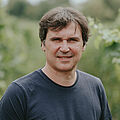Decentralized IoT system for controlling actuators using sensors in the agricultural sector (DISASA)
Project duration: January 2025 to December 2026
Summary
Due to climate change, the future water supply will experience increasing shortages and exacerbate social conflicts. Freshwater accounts for less than five percent of the world's total water resources and around two thirds of it is used for irrigation in agriculture, which is usually carried out manually and over large areas without taking into account the soil type or water requirements of the respective crops. In the case of grapevines, both an undersupply and an oversupply of water can have a negative impact on yield and wine quality. The aim of the research project, which is being carried out in cooperation with Fluid Systems & Automation GmbH and Offenburg University of Applied Sciences and funded by the German Federal Environmental Foundation (DBU), is to develop an intelligent and continuously controlled drip irrigation system based on the actual water requirements of the vines.
Clean drinking water is becoming increasingly scarce due to prolonged periods of drought, falling groundwater levels and increased water abstraction from rivers on the one hand, and flooding and pollution on the other. One perspective for agriculture here is the development of technologies for targeted irrigation with reduced waste of resources in order to minimize competition between agricultural crops and the population for this scarce resource. As part of the project, sensors will continuously record the water status of the soil and the vines as well as environmental conditions and plant physiological parameters in order to then make these data sets available to an artificial intelligence system together with weather forecasts, which will use them to calculate correlations between the drought stress of the vines and the collected measurement data. Based on past and predicted events, an algorithm then determines the amount of water and the timing of irrigation. The measured values and the calculated decisions of the artificial intelligence are validated by means of a scientific evaluation and adjustment, thereby optimizing the irrigation system. Early detection and an automated, intelligent response are intended to avoid both drought stress and high water consumption. The irrigation system is being tested in viticulture and can subsequently be transferred to other agricultural crops.
Contact person

Jonas Waber

Prof. Dr. Jochen Bogs

